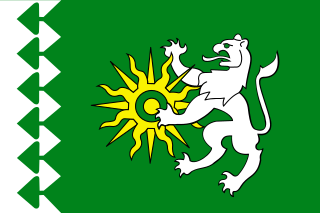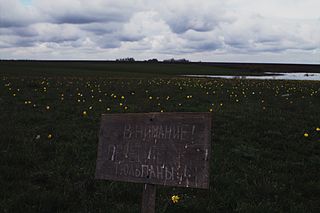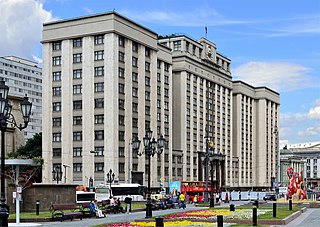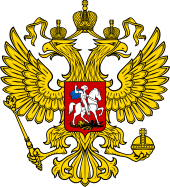
Russia is divided into several types and levels of subdivisions.

Verkhnyaya Tura is a town under the administrative jurisdiction of the Town of Kushva in Sverdlovsk Oblast, Russia, located in the upper streams of the Tura River, 187 kilometers (116 mi) north of Yekaterinburg. Population: 9,461 (2010 Census); 11,097 (2002 Census); 13,573 (1989 Census).

Beryozovsky is a town in Sverdlovsk Oblast, Russia, located on the Beryozovka River, 13 kilometers (8.1 mi) northeast of Yekaterinburg, the administrative center of the oblast. Population: 59,698 (2021 Census); 51,651 (2010 Census); 46,744 (2002 Census); 47,944 (1989 Census).

Atkarsk is a town in Saratov Oblast, Russia, located at the confluence of the Atkara and Medveditsa Rivers, 92 kilometers (57 mi) northwest of Saratov, the administrative center of the oblast. Population: 25,624 (2010 Census); 27,907 (2002 Census); 28,877 (1989 Census).

Samara Time (SAMT) is the time zone 4 hours ahead of UTC (UTC+04:00) and 1 hour ahead of Moscow Time (MSK+1). Samara Time is used in Samara Oblast, Udmurtia, Astrakhan Oblast, Ulyanovsk Oblast and Saratov Oblast.

Kovdorsky District is an administrative district (raion), one of the six in Murmansk Oblast, Russia. It is located to the west of the Kola Peninsula. The area of the district is 4,066 square kilometers (1,570 sq mi). Its administrative center is the town of Kovdor. Population: 21,297 (2010 Census); 24,404 (2002 Census); 36,786 (1989 Census). The population of Kovdor accounts for 88.4% of the district's total population.

Prokhorovsky District is an administrative district (raion), one of the twenty-one in Belgorod Oblast, Russia. Municipally, it is incorporated as Prokhorovsky Municipal District. It is located in the north of the oblast. The area of the district is 1,378.7 square kilometers (532.3 sq mi). Its administrative center is the urban locality of Prokhorovka. Population: 27,106 (2021 Census); 30,094 (2010 Census); 31,847 ; 29,505 (1989 Census). The population of Prokhorovka accounts for 36.1% of the district's total population.

Pugachyovsky District is an administrative and municipal district (raion), one of the thirty-eight in Saratov Oblast, Russia. It is located in the northeast of the oblast. The area of the district is 3,900.6 square kilometers (1,506.0 sq mi). Its administrative center is the town of Pugachyov. As of the 2010 Census, the total population of the district was 20,031.

Romanovsky District is an administrative and municipal district (raion), one of the thirty-eight in Saratov Oblast, Russia. It is located in the west of the oblast. The area of the district is 1,300 square kilometers (500 sq mi). Its administrative center is the urban locality of Romanovka. Population: 16,226 ; 18,150 (2002 Census); 19,404 (1989 Census). The population of Romanovka accounts for 44.8% of the district's total population.

Volsky District is an administrative and municipal district (raion), one of the thirty-eight in Saratov Oblast, Russia. It is located in the north of the oblast. The area of the district is 3,700 square kilometers (1,400 sq mi). Its administrative center is the town of Volsk. Population: 27,457 ; 29,977 (2002 Census); 34,174 (1989 Census).

Yershovsky District is an administrative and municipal district (raion), one of the thirty-eight in Saratov Oblast, Russia. It is located in the eastern central part of the oblast. The area of the district is 4,300 square kilometers (1,700 sq mi). Its administrative center is the town of Yershov. Population: 41,609 ; 50,337 (2002 Census); 53,333 (1989 Census). The population of Yershov accounts for 51.5% of the district's total population.

Alexeyevsky District is a territorial division in North-Eastern Administrative Okrug, one of the 125 in the federal city of Moscow, Russia. It is located in the northeast of the federal city. The area of the district is 5.2931 square kilometers (2.0437 sq mi). As of the 2010 Census, the total population of the district was 78,421.
The municipal divisions in Russia, also called municipal formations, are territorial divisions of the Russian Federation which are formally granted the authority to manage local affairs through local self-government. As of January 1, 2020, there are 20,846 municipal divisions in Russia, including 1,673 municipal districts, 635 urban okrugs, and 33 municipal okrugs.

The Dima Yakovlev Law, Dima Yakovlev Bill, Dima Yakovlev Act, anti-Magnitsky law, or Law of Scoundrels is a law in Russia that defines sanctions against U.S. citizens involved in "violations of the human rights and freedoms of Russian citizens". It creates a list of citizens who are banned from entering Russia, and also allows the government to freeze their assets and investments. The law suspends the activity of politically active non-profit organisations which receive money from American citizens or organisations. It also bans citizens of the United States from adopting children from Russia. The law was signed by Russian President Vladimir Putin on 28 December 2012 and took effect on 1 January 2013. The law is informally named after a Russian orphan adopted by a family from Purcellville, Virginia, who died of heat stroke after being left in a parked car for nine hours. The law is described as a response to the Magnitsky Act in the United States, which places sanctions on Russian officials who were involved in a tax scandal exposed by Russian lawyer Sergei Magnitsky; Magnitsky was alleged to have been handcuffed and tortured while in jail, albeit without supporting evidence for claims of torture.
Zapolyarny Urban Settlement is the name of several municipal formations in Russia.

The State Duma of the Federal Assembly of the Russian Federation of the 7th convocation is a former convocation of the lower house of Russian parliament.
The Russian fake news laws are a group of federal laws prohibiting the dissemination of information considered "unreliable" by Russian authorities, establishing the punishment for such dissemination, and allowing the Federal Service for Supervision of Communications, Information Technology and Mass Media (Roskomnadzor) to extrajudicially block access to online media publishing such information. The most well known of these laws is the Federal Law of 4 March 2022 No.32-FZ enacted during the Russian invasion of Ukraine; the adoption of this law caused the mass exodus of foreign media from Russia and termination of the activity of independent Russian media.

The 2019 Russian Fake News Law is a group of 2 federal laws, adopted by State Duma on 7 March 2019, approved by Federation Council on 13 March 2019, signed by President of Russia on 18 March 2019, allowing the Federal Service for Supervision of Communications, Information Technology and Mass Media to extrajudicially block access to online media publishing information, considered "unreliable" by Russian authorities, and establishing the punishment for such dissemination. The laws entered into force on 29 March 2019. These laws are the first in the series of Russian fake news laws.

The 2019 Russian Disrespect to Authorities Law is a group of 2 federal laws, adopted by State Duma on 7 March 2019, approved by Federation Council on 13 March 2019, signed by President of Russia on 18 March 2019, allowing the Federal Service for Supervision of Communications, Information Technology and Mass Media to extrajudicially block access to online sources containing the blatant disrespect for the state, the authorities, the society, the state symbols, the Constitution, and establishing the punishment for the dissemination of an information containing such blatant disrespect. The laws entered into force on 29 March 2019.

The Russian 2022 Laws Establishing War Censorship and Prohibiting Anti-War Statements and Calls for Sanctions is a group of federal laws promulgated by the Russian government during the Russian invasion of Ukraine. These laws establish administrative and criminal punishments for "discrediting" or dissemination of "unreliable information" about the Russian Armed Forces, other Russian state bodies and their operations, and the activity of volunteers aiding the Russian Armed Forces, and for calls to impose sanctions against Russia, Russian organizations and citizens. These laws are an extension of Russian fake news laws and are sometimes referred to as the fakes laws.













